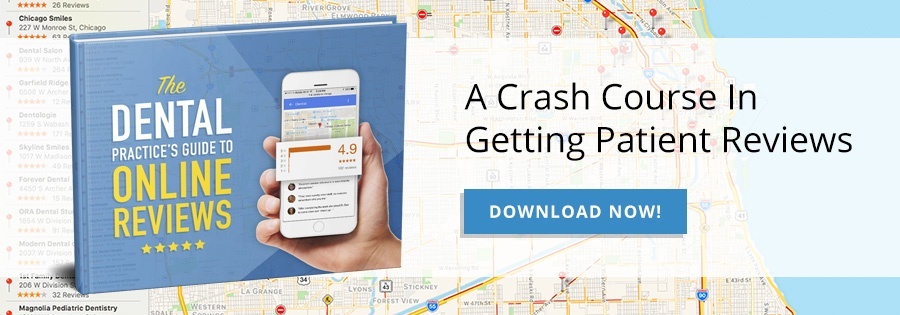Reviews for Dentists: The Data
Every year, BrightLocal’s Local Consumer Review Survey answers crucial questions about the average consumer’s online behavior, such as: Which elements of a review are most important? How do people use reviews to make decisions about local businesses? How can reviews help build a dental practice’s reputation?
At My Social Practice, we’ve been touting the importance of reputation management since the dawn of time (okay, since 2009). So, let’s take a closer look at some of the more relevant findings of BrightLocal’s report and what they mean for dental practices.
We promise we won’t even say, “I told you so.”
Key Themes: Google Reviews for Dentists
Businesses of all sizes and categories can benefit from learning how to use reviews to their advantage, but some of the survey’s key findings are particularly relevant in the dental industry:
- Business review responses: Getting a review is great, but replying is more critical than you might expect. 88% of users would choose a business that replies to every review, while only 47% would use one that doesn’t respond to any.
- Generative AI: Review responses don’t have to take a lot of time or effort. 58% of users preferred AI-generated replies over their human-written counterparts.
- Social media: Aside from Google, social media platforms are often used for reviews, with 34% of consumers using Instagram and 23% using TikTok specifically for local business reviews.
- Google is one of many options: When a user intends to visit a local business, 36% use two review sites, while 41% visit three or more before making a decision.
How Patients Use Reviews
Examining the behavior of the average online consumer can give us insight into how potential patients use reviews to choose a dentist.
Only 3% of online consumers said they never read reviews, and 75% said they either always or regularly read online reviews when actively looking for a local business. Given the large number of users who rely on reviews, we can identify a few trends.
Where Do Patients Read Reviews for Dentists?
Google is the most-used website for reading online reviews, but that is changing. Between 2023 and 2024, the number of consumers using Google for reviews dropped from 87% to 81%. Still, Google does claim the top spot by a long shot, followed by Facebook at 45% and Yelp at 44% for 2024.
Why is Google still king? Despite the decline in consumers listing Google as their primary review platform, the tech giant has remained competitive. Over the last year, Google Business Profiles have received several new features that allow businesses, particularly local businesses like dentists, to optimize listings with local SEO.
How Many Websites Do Patients Use?
One illuminating piece of information is that consumers, like potential dental patients, tend to use multiple review websites when searching for a local business. Less than 25% of users only check one review site before deciding. While local optimization for Google Business Profiles is clearly critical, potential patients also search reviews for dentists elsewhere.
We recommend maintaining an optimized social media presence and up-to-date listings on as many directories as possible. Dentists should focus on niche directories like HealthGrades and broad platforms like Yelp. Plus, as you try to encourage more patient reviews, you’ll be more likely to receive them if you provide multiple platforms for them to use.
Another reason to create and maintain multiple review profiles is dental branding consistency. As you build a recognizable and reputable image, potential patients should be able to see your dental brand identity reflected in each of these listings.
The more listings you have, the more visible you’ll be in search results, so a well-branded and dental SEO-friendly portfolio of review platform listings will help patients find and choose your practice.
Which Social Media Platforms Do Patients Use For Reviews?
Consumer usage of Instagram and TikTok for the specific purpose of finding local business reviews increased in 2024. In 2023, 32% of consumers looked for reviews on Instagram and 20% on TikTok. These numbers have increased to 34% and 23% this year, respectively. YouTube sits in between at 32% for 2024.
Social media is a must if you’re considering how to best encourage and leverage reviews for dentists. A social media dental marketing strategy should emphasize an active presence and engagement with commenters. The more visible your profiles are, the more reviews you’ll encourage.
What Are the Most Important Factors in Reviews For Dentists?
We know that patients use reviews to choose a local dentist, but there are components of a review that can make them more compelling.
Unsurprisingly, online users feel best about businesses whose reviews share positive patient experiences in the text, with 69% of users saying these types of reviews boost their perception of local businesses.
As for star ratings, 71% of consumers said they would not use a business whose average star rating was below three stars. This constitutes a significant drop—this number is 16% lower than in 2023! Most potential patients and online consumers expect a star rating between 4 and 5.
Are you wondering how many reviews your dental practice needs? 59% of users expect to see a local business have between 20 and 99 reviews. You can have a high average star rating, but without enough reviews, patients tend to be skeptical when there aren’t many ratings adding to the average. Users also want to see new reviews coming in, with 27% saying they expect to see new reviews within a two-week window.
If you need more reviews, there are simple solutions. Use automated dental reputation management software to send out review requests to patients as soon as they leave your practice. You can also start a campaign in your office to get more ratings using motivating goals and rewards for staff.
Finally, users are 41% more likely to use a local business if it responds to all reviews than a business that responds to none. Fortunately, automated review tools can help with that, too.
AI in Dental Reputation Management
We talk about AI a lot at My Social Practice (like, a lot), and artificial intelligence’s applications in dentistry extend far—even to reputation management.
As part of the survey, BrightLocal presented consumers with two examples of a business’s response to a review and asked them to choose which they preferred. Unknowingly, 58% of users chose an AI-generated reply over a human-written one.
While some may prefer to write their responses, this is promising information for dentists considering using tools like ChatGPT to help streamline in-office processes.
The Bottom Line: Reviews for Dentists in 2024
It’s clear that reviews are an important factor in choosing a local business for the modern online consumer (and dental patients). Patients are using more review platforms than ever to vet potential providers while simultaneously expecting high average scores, volume, and recency.
With the help of tools like automated reputation management software, AI generation, and SEO optimization, dental practices can enjoy the boost in authority and trustworthiness that comes with having a stellar (get it?) review portfolio.
Frequently Asked Questions
How do I ask for dental reviews?
An automated reputation management tool is an excellent way to ask for more patient reviews. These programs send automatic requests via email or text after a patient leaves the office. You can also make leaving reviews in your practice easy by posting signs with a QR code linked to your Google Business Profile. Finally, create an in-office review gathering campaign and offer great prizes to encourage staff to ask patients for reviews.
What is the best website for dental reviews?
More patients than ever are using multiple review websites when looking for a dentist. The top websites consumers use when seeking reviews for local businesses are:
- Google (Google Business Profiles)
- Yelp
- TikTok
- Trustpilot
- Healthgrades
- Apple maps
How does dental reputation management work?
Because reviews are crucial to your reputation as a dentist, it’s advisable to manage them manually or with an automated tool. The key areas to focus on are monitoring reviews, requesting new dental reviews, and responding to all reviews on your profiles.
About the Author: Megan Nielsen is an SEO strategist and the Grand Overlord of copywriting at My Social Practice. My Social Practice is a dental marketing company that offers a full suite of dental marketing services to thousands of dental practices throughout the United States and Canada.










